Med News 02/2019
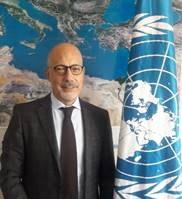
Editorial
by Gaetano Leone, Coordinator, UNEP/MAP — Barcelona Convention Secretariat
By the time this issue of the UNEP/MAP newsletter reaches you, we will already be in the final lap of our race to the 21st Meeting of the Contracting Parties to the Barcelona Convention (COP21) in Naples.
Preparations are in full swing and we are working with the Host Country, Italy, to make COP21 a decisive step forward in our collective endeavor for healthy Mediterranean marine and coastal ecosystems for the benefit of present and future generations.
On 23 October 2019, Italy organized a gathering of young representatives of the Contracting Parties to the Barcelona Convention to provide the Mediterranean Youth with a platform to make their voice heard in the outcome of COP21.
On UN Day (24 October 2019), UNEP/MAP—Barcelona Convention Secretariat organized in Athens an encounter with representatives of Mediterranean Civil Society and Academia to thrash out what they perceive as priorities for the UNEP/MAP – Barcelona Convention system in the coming years.
COP21will be a strategic meeting as representatives of the Contracting Parties are expected to define our new Medium-Term Strategy for 2022-2027 and examine a set of forward-looking decisions on important aspects pertaining to the implementation of the Barcelona Convention and its Protocols.
The draft decisions on the agenda of COP21 reflect our UNEP/MAP normative role in setting standards and regulations based on the best available scientific knowledge of the Mediterranean Sea and Coast, but also in developing tools enabling the effective implementation of the well-developed, but constantly evolving legal framework that the Barcelona Convention and its Protocols provide.
The COP21 Ministerial Segment will see the participation of ministers, senior policymakers and eminent experts from the Mediterranean region and the world. Two High-Level Panels will notably address four priority themes on the COP21 agenda, namely marine litter, biodiversity and marine protected areas, climate change and the blue economy in the Mediterranean.
I invite you to join our efforts to spread the word about COP21. This year, we are actively promoting the participation of journalists from the Mediterranean region to cover the meeting and to inform citizens in their countries of what will be discussed in Castel dell’Ovo, the historical seaside castle that will serve as a venue for the meeting in Naples.
You can follow developments on COP21 and, more broadly on Barcelona Convention, by following our newly launched Twitter account @UNEPMAPNews, our own UNEP/MAP official hashtag #BarcelonaConvention and the official hashtag of COP21 that we recently unveiled jointly with the Host Country #COP21Napoli.
2 December 2019

High-level Political Forum on Sustainable Development (9-18 July 2019)
The High-level Political Forum on Sustainable Development (HLPF) is the United Nations central platform for follow-up and review of the 2030 Agenda for Sustainable Development (2030 Agenda) and the Sustainable Development Goals (SDGs). The theme of ...
The High-level Political Forum on Sustainable Development (HLPF) is the United Nations central platform for follow-up and review of the 2030 Agenda for Sustainable Development (2030 Agenda) and the Sustainable Development Goals (SDGs). The theme of this year’s HLPF was “empowering people and ensuring inclusiveness and equality” with a special emphasis on six out of the 17 Goals, namely SDG 4 (Quality Education), SDG 8 (Decent Work and Economic Growth), SDG 10 (Reducing Inequalities), SDG 13 (Climate Action), SDG 16 (Peace, Justice and Strong Institutions), and SDG 17 (Partnerships).
Following the adoption of the 2030 Agenda for Sustainable Development (2030 Agenda) and SDGs in 2015, the conclusion of the first cycle of the HLPF represented a critical opportunity to take stock of how the Forum has delivered on its functions to promote and support the implementation, follow-up and review of the 2030 Agenda and to reflect on opportunities to strengthen the HLPF in the future.
Six Contracting Parties to the Barcelona Convention have submitted their Voluntary National Reviews (VNRs): Algeria, Bosnia and Herzegovina, Croatia, Israel, Tunisia and Turkey.
Since 2016, the following Contracting Parties to the Barcelona Convention have undertaken or have announced plans to undertake Voluntary National Reviews.
Click on the links below to open the VNR webpages and reports:
Albania (2018), Algeria (2019), Bosnia and Herzegovina (2019), Croatia (2019), Cyprus (2017), Egypt (2016, 2018), France (2016), Greece (2018), Italy (2017), Israel (2019), Lebanon (2018), Libya (2020), Malta (2018), Monaco (2017), Montenegro (2016), Morocco (2016, 2020), Slovenia (2017, 2020), Spain (2018),Tunisia (2019), Turkey (2016, 2019).
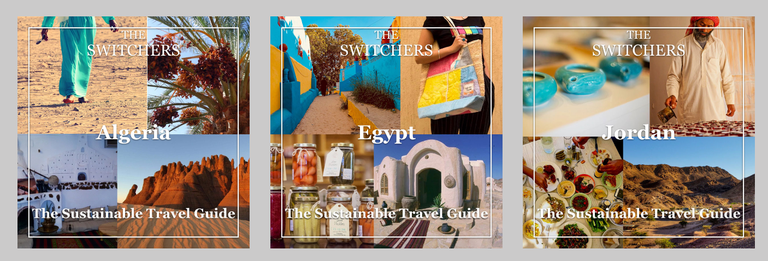
Sustainable holidays with the Switchers
Holidays are in everyone's minds! SwitchMed invite you to discover the Switchers Travel guides for Algeria, Egypt, Jordan, Lebanon, Morocco and Tunisia. The Switchers are green entrepreneurs who are creating circular and sustainable economies around ...
Holidays are in everyone's minds! SwitchMed invite you to discover the Switchers Travel guides for Algeria, Egypt, Jordan, Lebanon, Morocco and Tunisia. The Switchers are green entrepreneurs who are creating circular and sustainable economies around the Mediterranean. These guides provide a genuine alternative to conventional tourism spots that have a positive social and environmental impact. Discover them and download them!
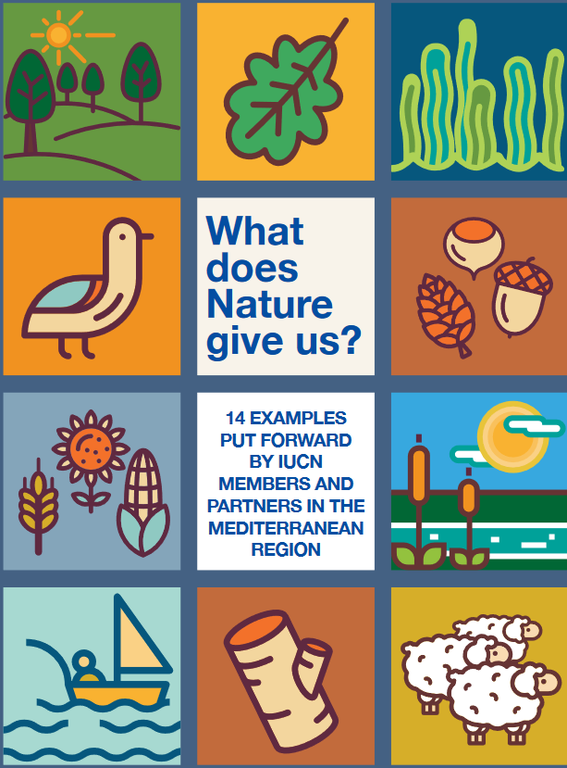
"Towards Nature-based Solutions in the Mediterranean": the new booklet of the IUCN
The International Union for the Conservation of Nature (IUCN) has just released a new booklet intitled "Towards Nature-based Solutions in the Mediterranean". The purpose of this booklet is to promote Nature-based Solutions (NbS) and help clarify how ...
The International Union for the Conservation of Nature (IUCN) has just released a new booklet intitled "Towards Nature-based Solutions in the Mediterranean". The purpose of this booklet is to promote Nature-based Solutions (NbS) and help clarify how it can be applied in different types of Mediterranean ecosystems, using 14 examples of interventions proposed by IUCN Members and partners in the region as a part of a collective effort. Each of these practical experiences showcases both the weaknesses and strengths of a model that is still in the process of being consolidated and accepted by a wide community of experts, while IUCN is consolidating the SBN standard foreseen to be approved in the next IUCN World Conservation Congress (Marseille, June 2020).
Click here to access to the booklet.
Focal Points of UNEP/MAP examine measures aimed at boosting the implementation of the Barcelona Convention and its Protocols
- Representatives of Mediterranean States and the European Union discussed new measures aimed at curbing pollution, protecting biodiversity and stimulating blue growth in the Mediterranean region.
- Decisions examined by the Focal Points of ...
- Representatives of Mediterranean States and the European Union discussed new measures aimed at curbing pollution, protecting biodiversity and stimulating blue growth in the Mediterranean region.
- Decisions examined by the Focal Points of UNEP/MAP are crucial to the achievement of Good Environmental Status in the Mediterranean.
- The 21st Meeting of the Contracting Parties to the Convention for the Protection of the Marine Environment and the Coastal Region of the Mediterranean (COP21 Barcelona Convention) will consider the decisions for adoption on 2-5 December 2019 in Naples, Italy.
Athens, 13 September 2019 – Focal Points of the United Nations Environment Programme/Mediterranean Action Plan (UNEP/MAP) met in Athens on 10-13 September 2019 to examine the progress on activities carried out during the 2018-2019 biennium, the Programme of Work for the next two years (2019-2020) and several draft decisions to be submitted for adoption to the 21st Meeting of the Contracting Parties to the Barcelona Convention (COP21, 2-5 December 2019, Naples, Italy).
Most of the Contracting Parties (21 Mediterranean States and the European Union) were represented at the four-day Focal Points meeting, which is part of the intergovernmental process coordinated by UNEP/MAP under the Barcelona Convention. Focal Points for the Contracting Parties meet every two years to examine technical and financial aspects of draft decisions prior to their submission for adoption by the COP, the supreme governing body of the Convention. Partners of UNEP/MAP, including non-governmental organizations, United Nations bodies, specialized agencies, convention secretariats and intergovernmental organizations attend the meeting as observers.
 |
| From left to right: Mr. Konstantin Aravossis, Ms. Klodiana Marika and Mr. Gaetano Leone, during the opening session of the MAP Focal Points meeting |
The UNEP/MAP Focal Points meeting was opened on 10 September 2019 by Ms. Klodiana Marika of Albania, President of the Bureau of the Contracting Parties to the Barcelona Convention, Mr. Gaetano Leone, Coordinator of the Mediterranean Action Plan and Mr. Konstantin Aravossis, Secretary General for Natural Environment and Water within the Greek Ministry of Environment and Energy. In his statement, Mr. Leone welcomed the continued support of the Contracting Parties to the implementation of the UNEP/MAP medium-term strategy against a background of global environmental degradation, to which the Mediterranean region is not immune.
“Immediate and concerted action is required, particularly with a view to implementing Sustainable Development Goal 14 on Life below water”, observed Mr. Leone who also underscored the relevance of the themes discussed at the meeting to the global environmental agenda, notably the 2019 Climate Action Summit, the forthcoming Santiago Climate Change Conference, the United Nations Decade of Ocean Science for Sustainable Development (2021–2030) and ongoing preparations for the adoption of a post-2020 Global Biodiversity Framework. “The MAP-Barcelona Convention system's mandate has never been more relevant”, he concluded.
During four days of deliberations (10-13 September 2019), MAP Focal Points examined a host of draft decisions pertaining to pollution prevention and reduction; marine biodiversity and the Blue Economy in the Mediterranean region, including:
- six new regional plans to reduce or prevent marine pollution from land-based sources;
- new standards and guidelines to curb pollution under three Protocols of the Barcelona Convention addressing dumping, offshore and land-based sources;
- guidelines on Adopt-a-Beach activities aimed at curbing marine litter and on phasing out single-use plastic bags;
- common guidelines and standards pertaining to the disposal of oil and oily mixtures: the use and disposal of drilling fluids and cuttings and special restrictions and conditions for Specially Protected Areas (SPA) within the framework of the Mediterranean Offshore Action Plan;
- a set of regional measures aimed at supporting the development of green and circular businesses and stimulating demand for sustainable products;
- a mid-term evaluation of the Mediterranean Strategy for Sustainable Development (2016–2025) and of the regional Action Plan on Sustainable Consumption and Production in the Mediterranean;
- environmental assessments in the Mediterranean, including a preliminary assessment of risks associated to climate and environmental changes in the Mediterranean Region;
- a common regional framework for Integrated Coastal Zone Management (ICZM) in line with the ICZM Protocol of the Barcelona Convention;
- identification and conservation of Sites of Particular Ecological Interest in the Mediterranean, including Specially Protected Areas of Mediterranean Importance (SPAMI);
- the evaluation of the progress made and challenges encountered by Mediterranean countries in the implementation of Aichi Target 11 under the UN Convention on Biodiversity (By 2020, at least 17 per cent of terrestrial and inland water areas and 10 per cent of coastal and marine areas, especially areas of particular importance for biodiversity and ecosystem services, are conserved through effectively and equitably managed, ecologically representative and well-connected systems of protected areas and other effective area-based conservation measures, and integrated into the wider landscape and seascape);
- the Strategic Action Programme for the conservation of Biological Diversity (SAP BIO) in the Mediterranean Region; the strategy on Monk Seal; Action Plans concerning Marine Turtles, Cartilaginous Fishes and Marine Vegetation; and the Classification of Benthic Marine Habitat Types for the Mediterranean Region and Reference List of Marine and Coastal Habitat Types in the Mediterranean;
- updated guidelines regulating the placement of artificial reefs at sea.
In addition, the Focal Points of UNEP/MAP discussed a draft road map for the possible designation of the Mediterranean Sea as an Emission Control Area (ECA) for Sulphur Oxides (SOx) under Annex VI of the International Convention for the Prevention of Pollution from Ships (MARPOL). Curbing SOx emissions from ship movements, which often occur close to the densely populated coasts of the Mediterranean countries, will result in significant health benefits.
The UNEP/MAP strategic orientations were also in focus at the meeting as Focal Points discussed a roadmap for the preparation of the Medium-Term Strategy (2022-2027). The process will be driven by the Contracting Parties and will involve consultations with stakeholders.
In the course of 2019, several thematic intergovernmental consultations took place under the auspices of UNEP/MAP to prepare the draft decisions that were examined by the Focal Points meeting, thus paving the way for COP21.
In addition to considering the draft decisions for adoption, COP21 (Naples, Italy, 2-5 December 2019) will host ministerial-level discussions with the aim of highlighting linkages between global processes and regional developments in the Mediterranean. The UN Secretary-General’s Envoy for the Ocean, H.E. Mr. Peter Thomson, and other distinguished guests are expected to take part in the high-level session.
COP21 will mark an important milestone in the Mediterranean environmental governance process that UNEP/MAP continues to successfully coordinate despite disparities in socio-economic contexts and capacities among the Contracting Parties to the Barcelona Convention.
NOTES TO EDITORS
About the UNEP/Mediterranean Action Plan – Barcelona Convention System
UNEP is the leading global voice on the environment. It provides leadership and encourages partnership in caring for the environment by inspiring, informing, and enabling nations and peoples to improve their quality of life without compromising that of future generations. UNEP works with governments, the private sector, civil society and with other UN entities and international organizations across the world. In 1974, UNEP established its Regional Seas Programme with the scope of coordinating activities aimed at the protection of the marine environment through a regional approach. The Mediterranean Action Plan was the first UNEP initiative to be developed under the Programme and became the model for other seas across the globe.
In 1975, the Mediterranean States and the European Community approved the Mediterranean Action Plan (UNEP/MAP) as the institutional framework for cooperation in addressing common challenges of marine environmental degradation. UNEP/MAP endorsed the preparation of a framework convention for the protection of the marine environment against pollution.
The Convention for the Protection of the Mediterranean Sea against Pollution was adopted in 1976 by the Conference of Plenipotentiaries of the Coastal States of the Mediterranean Region for the Protection of the Mediterranean Sea in Barcelona, Spain. It was amended on 10 June 1995 and renamed Convention for the Protection of the Marine Environment and the Coastal Region of the Mediterranean (Barcelona Convention).
For more information, please contact:
Jihed Ghannem, Public Information Officer, UNEP/MAP - Barcelona Convention Secretariat ghannem[at]un.org
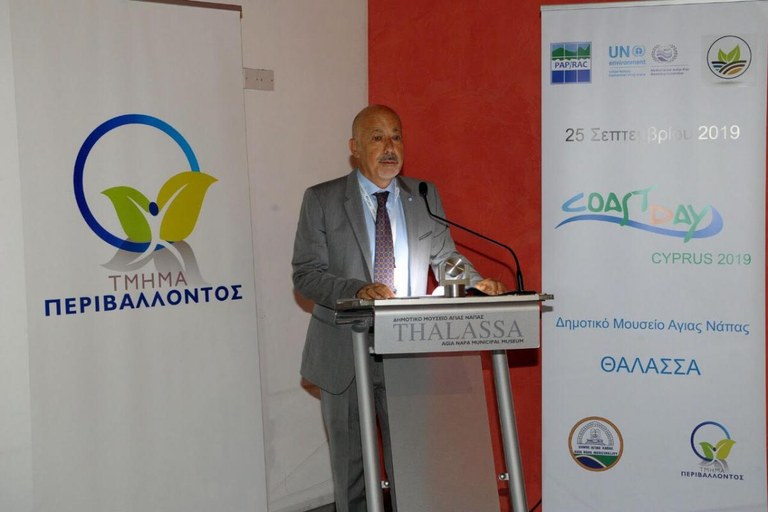
Coast Day 2019: celebrating the importance of Mediterranean coastal zones
The 2019 edition of the Coast Day celebration was held in Ayia Napa, Cyprus, on 25 September 2019. The Priority Actions Programme/Regional Activity Centre (PAP/RAC) organized the event in collaboration with the Ministry of Agriculture, Rural ...
The 2019 edition of the Coast Day celebration was held in Ayia Napa, Cyprus, on 25 September 2019. The Priority Actions Programme/Regional Activity Centre (PAP/RAC) organized the event in collaboration with the Ministry of Agriculture, Rural Development and Environment of Cyprus.
Coast Day, which is celebrated annually since 2007, is aimed at raising awareness of the importance and vulnerability of the coastal zones in the Mediterranean.
The Deputy Minister for Shipping, the Permanent Secretary for shipping, the Permanent Secretary for Agriculture, the Mayor of Ayia Napa, the Bishop of Ayia Napa and representatives of the Department of Environment of Cyprus attended the event. Ms. Xenia Loizidou, Director of the AKTI Project and Research Centre, was announced as the Coast Day Ambassador for 2019.
Participants in the Coast Day event in Cyprus included tourism professionals and local authority officials as well as non-governmental organizations.
The Integrated Coastal Zone Management (ICZM) Strategy for Cyprus (2018-2030) took centre stage this year. “Let’s be strategic”, the theme selected for this year’s edition, reflects the need to apply a strategic ICZM approach to the management of coastal zones.
In his speech at the opening session, Mr. Gaetano Leone, the UNEP/MAP Coordinator, observed that “Coast Day has become a tradition for many years now around the Mediterranean. A tradition that helps us reflect on the state of the coastal areas of the Mediterranena and think together what measures can be taken to reduce pressures being exerted on them". Read more
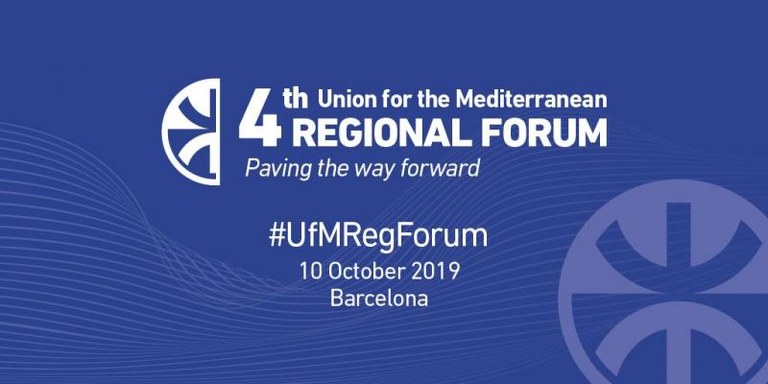
Event “Climate and Environment in the Mediterranean region, our common challenge”
The 4th edition of the Regional Forum of the Union for the Mediterranean (UfM): “Paving the way forward”, has taken take place on 10 October 2019 in Barcelona, Spain.
Building on the success of the first three editions, the 4th UfM Regional Forum ...
The 4th edition of the Regional Forum of the Union for the Mediterranean (UfM): “Paving the way forward”, has taken take place on 10 October 2019 in Barcelona, Spain.
Building on the success of the first three editions, the 4th UfM Regional Forum provided the occasion to take stock of the progress achieved to date, and to discuss the way forward to strengthen development, cooperation and regional integration in the Euro-Mediterranean region.
On the occasion of the Regional Forum, the UfM Secretariat have organised an event to present the main conclusions of the first-ever comprehensive scientific report on the impact of climate and environmental change in the Mediterranean region, developed since 2015 by a network of over 80 scientists from across the Euro-Mediterranean area named MedECC – Mediterranean Experts on Climate and Environmental Change.
During the Forum, scientists, policymakers and key stakeholders have discussed the main vulnerabilities in our region as well as its resilience to climate change in the coming years.
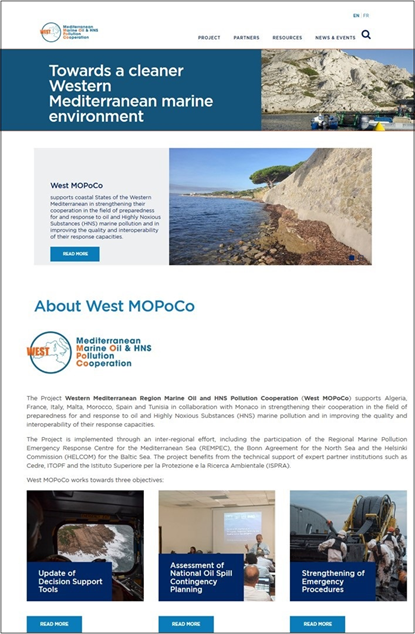
Launch of the West MOPoCo Website
In the framework of the Project Western Mediterranean Region Marine Oil and HNS Pollution Cooperation (West MOPoCo), co-financed by the European Commission to run during 2019-2020, REMPEC announced the launch of Website of the West MOPoCo ...
In the framework of the Project Western Mediterranean Region Marine Oil and HNS Pollution Cooperation (West MOPoCo), co-financed by the European Commission to run during 2019-2020, REMPEC announced the launch of Website of the West MOPoCo Project.
The Website provides detailed information on the project, its activities, related news and events and give access to downloadable material prepared under the project.
West MOPoCo supports Algeria, France, Italy, Malta, Morocco, Spain and Tunisia in collaboration with Monaco in strengthening their cooperation in the field of preparedness for and response to oil and Highly Noxious Substances (HNS) marine pollution and in improving the quality and interoperability of their response capacities.
The Project is implemented through an inter-regional effort, including the participation of the Regional Marine Pollution Emergency Response Centre for the Mediterranean Sea (REMPEC), the Bonn Agreement for the North Sea and the Helsinki Commission (HELCOM) for the Baltic Sea. The project benefits from the technical support of expert partner institutions such as Cedre, ITOPF and the Istituto Superiore per la Protezione e la Ricerca Ambientale (ISPRA).
To know more about the project and follow its progress, consult the First West MOPoCo Newsletter and visit the West MOPoCo Website regularly updated by the West MOPoCo Team.
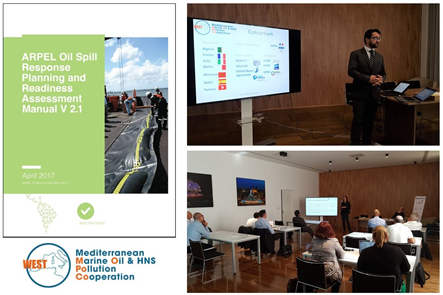
Malta assesses its National Contingency Plan with the harmonised self-assessment tool - RETOS
REMPEC attended the first out of 7 national workshops aiming at assessing the National Contingency Plans (NCP) of the Western Mediterranean coastal States, using the Readiness Evaluation Tool for Oil Spills (RETOS™), which was introduced at the ...
REMPEC attended the first out of 7 national workshops aiming at assessing the National Contingency Plans (NCP) of the Western Mediterranean coastal States, using the Readiness Evaluation Tool for Oil Spills (RETOS™), which was introduced at the Sub-regional Workshop on the use of RETOS (24-26 April 2019, REMPEC, Valletta, Malta).
Malta has organized a three-day workshop (08-10 October 2019) attended by 10 representatives from Maltese authorities involved in the NCP, namely Transport Malta, the Civil Protection Department, the Environmental and Resources Authority as well as the Armed Forces of Malta.
This activity is implemented in the framework of the Project Western Mediterranean Region Marine Oil and HNS Pollution Cooperation (West MOPoCo) and co-financed by the European Commission's Humanitarian Aid and Civil Protection department (DG ECHO).
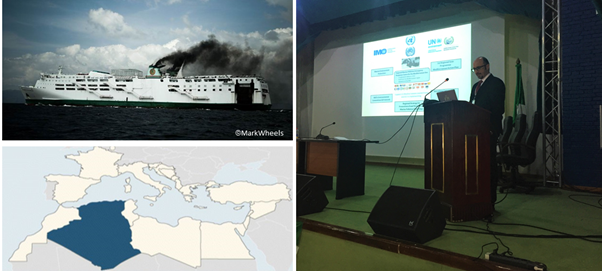
REMPEC fosters its cooperation with EMSA for the SAFEMED IV Training on MARPOL Annex VI for Algeria
REMPEC participated in the SAFEMED IV Training on Annex VI to the International Convention for the Prevention of Pollution from Ships (MARPOL) for Algeria organised by the European Maritime Safety Agency (EMSA) from 8 to 9 October 2019 at the École ...
REMPEC participated in the SAFEMED IV Training on Annex VI to the International Convention for the Prevention of Pollution from Ships (MARPOL) for Algeria organised by the European Maritime Safety Agency (EMSA) from 8 to 9 October 2019 at the École Nationale Supérieure Maritime (ENSM) in Bou Ismaïl, Tipaza Province, Algeria, within the framework of the European Union (EU)-funded SAFEMED IV project.
Over 40 participants from the Algerian maritime administration, environmental administration, port authorities, shipowners, ferry operators, fuel suppliers and students at the ENSM attended the training course.
The main objective of the training was to deliver a thorough overview of MARPOL Annex VI by covering issues related to Nitrogen Oxides, Sulphur Oxides, Ozone Depleting Substances, etc. The training also included practical exercises on enforcement practices as well as presentations on the compliance, monitoring and enforcement of MARPOL Annex VI. Moreover, the Algerian maritime administration delivered a short presentation regarding the future plans for ratification of MARPOL Annex VI, the current arrangements and their implementation.
In the context of the on-going cooperation with EMSA on issues related to the protection of the marine environment, REMPEC contributed to the training by delivering a presentation on the possible designation of the Mediterranean Sea Area as an Emission Control Area for sulphur oxides pursuant to MARPOL Annex VI, within the framework of the Barcelona Convention. The Centre also took this opportunity to discuss, in the margins of the training, with the Algerian maritime administration about its forthcoming activities in 2019, including the organisation of a National Workshop on Ratification and Effective Implementation of MARPOL Annex VI for Algeria to be financed by the IMO’s Integrated Technical Cooperation Programme (ITCP), as an important milestone to follow up on the efforts of Algeria with regard to MARPOL Annex VI.
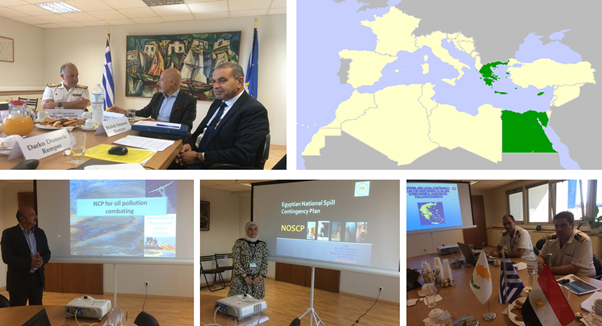
First Meeting of the National Competent Authorities for the Development of the Sub-regional Marine Oil Pollution Contingency Plan (SCP) between Cyprus, Egypt and Greece
At the 6th Cyprus- Egypt-Greece Trilateral Summit (Elounda, Crete, 10 October 2018), where a Joint Declaration by Cyprus, Egypt and Greece was adopted, the Heads of State and Government expressed their determination to proceed promptly with, inter ...
At the 6th Cyprus- Egypt-Greece Trilateral Summit (Elounda, Crete, 10 October 2018), where a Joint Declaration by Cyprus, Egypt and Greece was adopted, the Heads of State and Government expressed their determination to proceed promptly with, inter alia, the elaboration and implementation of a Sub – Regional Marine Oil Pollution Contingency Plan (SCP) for the preparedness and response to accidental marine pollution in the framework of the Barcelona Convention. In this context, the support of REMPEC was officially requested through the UN Environment/Mediterranean Action Plan-Barcelona Convention Secretariat.
The First meeting of the national competent authorities for the development of the Sub-regional Marine Oil Pollution Contingency Plan between Cyprus, Egypt and Greece (Piraeus, Greece, 9 -10 October 2019), marked the launch of this ambitious project aiming at the adoption of the sub-regional contingency plan in 2020.
The General Director for Shipping from the Ministry of Maritime Affairs and Insular Policy, and the Coordinator of the UN Environment/Mediterranean Action Plan-Barcelona Convention Secretariat opened the meeting emphasising the importance of this initiative which will further strengthen the capacity of the Mediterranean coastal States to response jointly to marine pollution incident, and will complement seven (7) similar sub-regional contingency plans in place in the region.
Officials from the three countries examined the first draft sub-regional contingency plan prepared by REMPEC and agreed on the following steps toward the completion of the plan, its annexes and the related agreement, as well as a programme of activities for its implementation. The Second Meeting of the National Competent Authorities for the Development of the Sub-regional Marine Oil Pollution Contingency Plan (SCP) between Cyprus, Egypt and Greece will be held in Cyprus, in November 2019.

Decisions to submit for COP21 from REMPEC
Draft Decision IG.24/8: Road Map for the Possible Designation of the Mediterranean Sea Area as an Emission Control Area for Sulphur Oxides Pursuant to MARPOL Annex VI, within the Framework of the Barcelona Convention
The designation of the proposed Mediterranean Sea Area as an Emission Control Area (Med ECA) would improve the environment and benefit the health of the inhabitants in the region by reducing lung cancer and cardiovascular disease mortality. Indeed, ...
The designation of the proposed Mediterranean Sea Area as an Emission Control Area (Med ECA) would improve the environment and benefit the health of the inhabitants in the region by reducing lung cancer and cardiovascular disease mortality. Indeed, the issue of the prevention of air pollution relates to a range of industries from shipping, ship building to fuel production and tourism which should reduce their emissions of sulfur oxyde (SOx) into the atmosphere. It will also have linkage with the regional and international obligations borne by the countries in the region regarding the implementation of Annex VI to the International Convention for the Prevention of Pollution from Ships (MARPOL).
The draft road map for the possible designation of the proposed Med ECA will provide the Contracting Parties to the Barcelona Convention and the relevant stakeholders, such as ship owners, operators, builders, fuel producers and research institutes, with a clear vision of the steps to be taken to fulfil the goal of designating the Med ECA. It demonstrates the timeline to be observed and key activities to be carried out in order to achieve such an objective, allowing the relevant actors to prepare for as well as participate actively in the implementation of the substantive and crucial actions.

Decisions to submit for COP21 from REMPEC
Draft Decision IG.24/9 “Mediterranean Offshore Guidelines and Standards: (a) Common Standards and Guidance on the Disposal of Oil and Oily Mixtures and the Use and Disposal of Drilling Fluids and Cuttings; (b) Common Standards and Guidelines for Special Restrictions or Conditions for Specially Protected Areas (SPA) within the Framework of the Mediterranean Offshore Action Plan”
With the expansion of offshore oil and gas exploitation activities in the Mediterranean and the increasing interest from a number of Contracting Parties to the Barcelona Convention, it is crucial to ensure that offshore activities are properly ...
With the expansion of offshore oil and gas exploitation activities in the Mediterranean and the increasing interest from a number of Contracting Parties to the Barcelona Convention, it is crucial to ensure that offshore activities are properly regulated so that their development does not come at the cost of the marine and coastal environment.
To this effect, the Mediterranean Offshore Action Plan adopted by the Contracting Parties in 2016 defines measures which, if applied at regional level and by each Mediterranean coastal State within their jurisdiction, will ensure the safety of offshore activities and reduce their potential impact on the marine environment and its ecosystem. The Mediterranean Offshore Action Plan call for the definition of commonly agreed regional offshore standards and guidelines to be integrated and used at national level.
The proposed common standards and guidance have been developed through a collective and fruitful consultative process and have been reviewed and revised by relevant MAP bodies. Their adoption by the Contracting Parties would allow harmonised regional practices in the Mediterranean Sea Area regarding i) the disposal of oil and oily mixtures, and the use and disposal of drilling fluids and cuttings and associated analytical measurements; from one hand and ii) the process regarding offshore activities in Specially Protected Areas (SPAs), covering the full range of development life cycle stages, including geophysical survey, exploratory drilling, field development and decommissioning, with the view to ensuring that no significant impacts are caused on Specially Protected Areas (SPAs).

Third Meeting of the Mediterranean Network of Law Enforcement Officials relating to MARPOL within the framework of the Barcelona Convention (MENELAS)
The Third Meeting of the Mediterranean Network of Law Enforcement Officials relating to the International Convention for the Prevention of Pollution from Ships (MARPOL) within the framework of the Convention for the Protection of the Marine ...
The Third Meeting of the Mediterranean Network of Law Enforcement Officials relating to the International Convention for the Prevention of Pollution from Ships (MARPOL) within the framework of the Convention for the Protection of the Marine Environment and the Coastal Region of the Mediterranean (“the Barcelona Convention”) (MENELAS) has been held at REMPEC premises in Valletta, Malta from 15 to 16 October 2019.
The Meeting, which is financed by the Mediterranean Trust Fund (MTF), is being organised by REMPEC pursuant to the Programme of Work and Budget for 2018-2019 of the Mediterranean Action Plan (MAP) of the United Nations Environment Programme (UNEP), also referred to as UNEP/MAP, adopted by the Twentieth Ordinary Meeting of the Contracting Parties to the Barcelona Convention and its Protocols (Tirana, Albania, 17-20 December 2017).
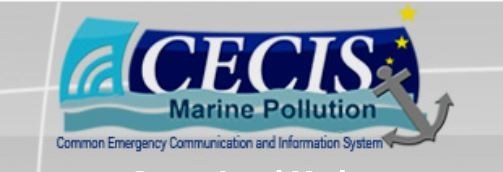
Sub-regional workshop on the use of the Common Emergency Communication and Information System (CECIS) and the Mediterranean Emergency Reporting System (MedERSys), 22-23 October 2019
The Workshop has been organised by the Regional Marine Pollution Emergency Response Centre for the Mediterranean Sea (REMPEC) and the Directorate-General for European Civil Protection and Humanitarian Aid Operations (DG ECHO) in the framework of the ...
The Workshop has been organised by the Regional Marine Pollution Emergency Response Centre for the Mediterranean Sea (REMPEC) and the Directorate-General for European Civil Protection and Humanitarian Aid Operations (DG ECHO) in the framework of the Project Western Mediterranean Region Marine Oil and HNS Pollution Cooperation (West MOPoCo) (Brussels, Belgium, 22-23 October 2019).
The main objective of the Workshop was to provide the officers of the national authorities responsible for preparedness for and response to accidental marine pollution with the knowledge on CECIS Marine Pollution interface and functionalities. The Workshop also envisaged the use of CECIS Marine Pollution in the Mediterranean to enhance coordination of requests and offers of international assistance, taking into account procedure approved by the Contracting Parties to the Barcelona Convention (Decision IG.23/11 - Mediterranean Guide on Cooperation and Mutual Assistance in Responding to Marine Pollution Incidents).

Coast Day celebrated throught the Mediterranean
Apart from the central regional celebration in Ayia Napa, Cyprus, Coast Day 2019 was celebrated in several other Mediterranean countries. Read more
Apart from the central regional celebration in Ayia Napa, Cyprus, Coast Day 2019 was celebrated in several other Mediterranean countries. Read more

Decision to submit for COP21 from PAP/RAC
Decision IG.24/5: “Common Regional Framework for Integrated Coastal Zone Management”
The objective of this Decision is to facilitate the implementation of the Protocol on Integrated Coastal Zone Management (ICZM) by providing strategic orientations for the implementation of ICZM at different geographical scales and administrative ...
The objective of this Decision is to facilitate the implementation of the Protocol on Integrated Coastal Zone Management (ICZM) by providing strategic orientations for the implementation of ICZM at different geographical scales and administrative levels (from the whole Mediterranean through sub-regional to national/local levels) and detailing some of the tools and instruments needed for that, such as environmental assessments; monitoring; coordination of planning processes on land and sea; governance mechanisms; land policy, economic and fiscal instruments; training, communication and information activities – all this in a context of international cooperation among the Contracting Parties with the support of UN Environment/MAP and its Components.
The added value of this Decision is in:
- introducing Marine Spatial Planning (MSP) as a part of the implementation of the ICZM Protocol, in line with the definition of the coastal zone within its landward and seaward limits;
- clarifying the context in which climate change issues can be effectively addressed with the support of the Barcelona Convention (BC) system i.e. by including the adaptation measures into ICZM and MSP plans and strategies;
- screening the existing instruments, provisions and measures (adopted within the BC system but also some of the most relevant world-wide instruments) and indicating when and why that should be used in combination to solve various environmental issues and ensure sustainability;
- proposing a new Action Plan for the implementation of the ICZM Protocol in 2020-2027.
This Decision is one of the most comprehensive ones; it will enhance the synergy and coordination of the entire BC system and its strategic and policy instruments, which was one of the reasons behind the preparation and adoption of the ICZM Protocol.
If GES and environmental sustainability are the ultimate goals set for the BC system, they require approaches and processes able to lead the CPs towards these goals. It is not possible to regulate nature or environment; what man can do is to regulate the use he makes of them and his own behaviour i.e. change the socio-economic patterns that will yield positive effects on the state of environment.
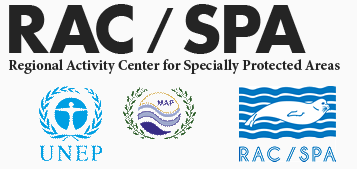
Decision to submit for COP21 from SPA/RAC
The 21st Barcelona Convention ordinary Conference of the Parties will provide a renewed opportunity to discuss and take decisions that would bring us closer to the overall objective of a healthier Mediterranean.
In relation to marine biodiversity and protected areas, the COP 21 is expected to adopt decisions for the review and adjustment of regional strategies, and the setting-up of initiatives to promote cooperation towards the sustainable management and ...
In relation to marine biodiversity and protected areas, the COP 21 is expected to adopt decisions for the review and adjustment of regional strategies, and the setting-up of initiatives to promote cooperation towards the sustainable management and use of marine resources, including:
• The development of a new Strategic Action Programme for the conservation of Biological diversity in the Mediterranean region (SAP BIO) as well as a new roadmap to strengthen the network of marine protected areas in the Mediterranean, in line with the CBD Post-2020 Global Biodiversity Framework.
• The setting-up of a multidisciplinary think tank that can provide advice and timely orientations on MPA planning and management in the Mediterranean;
• The establishment of a Directory of Mediterranean Specially Protected Areas, for a better visibility and monitoring of MPAs established in the framework of the Barcelona Convention.;
• The inclusion of 4 new areas, namely Cerbère-Banyuls Marine Nature Reserve (France), the Egadi Islands Marine Protected Area (Italy), the Landscape Park Strunjan (Slovenia) and the Cetaceans Migration Corridor in the Mediterranean (Spain), in the List of Specially Protected Areas of Mediterranean Importance. The SPAMI List was created, in 2001, to promote regional cooperation in the management and conservation of natural areas, as well as in the protection of threatened species and their habitats. Presently, the SPAMI List includes 35 sites proposed by 10 countries;
• The drafting of the concepts in order to set up the SPAMI Day and the Mediterranean Diploma for Specially Protected Areas of Mediterranean Importance and submit them for consideration by the Contracting Parties at their COP 22;
• The adoption of the updated strategy for the conservation of monk seal and the action plans for the conservation of cartilaginous fishes, marine turtles and vegetation in the Mediterranean, which include monitoring sections in line with the Ecosystem Approach principles and the Integrated Monitoring and Assessment Programme (IMAP) of the Barcelona Convention;
• The adoption Draft updated classification of benthic and marine habitat types for the Mediterranean region and the Draft Updated Reference List of Marine Habitat Types for the Selection of Sites to be included in the National Inventories of Natural Sites of Conservation Interest in the Mediterranean. The updated Classification and Reference List are more comprehensive, particularly as regards coralligenous and deep-sea habitats, and are aligned with the habitats classification of EUNIS, the European Nature Information System. This will enable a coherent use of the Reference list as much for national inventories as for monitoring programmes, and an adequate assessment of marine biodiversity in the Mediterranean in the framework of the IMAP.
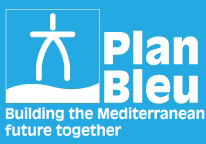
Decision to submit for COP21 from Plan Bleu
Since the late 1970’s countries surrounding the Mediterranean Sea and the European Union, Parties to the Barcelona Convention, have recognized the importance of common assessments on the State of the environment and development in the region, major ...
Since the late 1970’s countries surrounding the Mediterranean Sea and the European Union, Parties to the Barcelona Convention, have recognized the importance of common assessments on the State of the environment and development in the region, major future trends and potential future scenarios to critically inform decision making.
At COP 21, the Secretariat of the MAP Barcelona Convention System, through its Plan Bleu Regional Activity Center, will present an important new assessment: the 2019 Report on the State of the Environment and Development in the Mediterranean (SoED 2019), as well as an updated dashboard of indicators to monitor the advancement of the Mediterranean Strategy for Sustainable Development, closely articulated with global SDG indicators.
The SoED 2019 report, prepared and reviewed by about 100 MAP components and partners under the lead of Plan Bleu Regional Activity Center, will provide public and private decision makers with an updated description of current environment and development challenges in the Mediterranean, insisting on their interactions and emerging solutions. The last Mediterranean SoED report was published ten years ago. New findings and Key Messages will help Contracting Parties agree on future priorities for action, and design a new Medium-Term Strategy for 2022-2027.
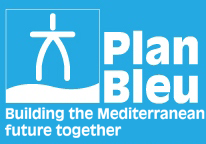
Decision to submit for COP21 from Plan Bleu
At COP 21, countries will be consulted on a roadmap for the second phase of MED 2050 foresight on the future of the Mediterranean at horizon 2050. Coming long after the reference works published by Plan Bleu in 1989 and 2005, MED 2050 will bring new ...
At COP 21, countries will be consulted on a roadmap for the second phase of MED 2050 foresight on the future of the Mediterranean at horizon 2050. Coming long after the reference works published by Plan Bleu in 1989 and 2005, MED 2050 will bring new insights on potential sustainable futures for the Mediterranean region, and necessary transitions. MED 2050 first phase focused on long-term trends and setting-up partnerships. The second phase will identify contrasted visions for the future across the basin, in a participatory approach, and help co-construct transitions pathways towards a sustainable and inclusive future.
Finally, countries will discuss a proposed process for a consultation and potential endorsement of the First assessment report on state and risks of climate and environmental change in the Mediterranean currently prepared by a network of voluntary scientists jointly supported by MAP and the Union for the Mediterranean Secretariats. As evidence points out, climate change already causes multiple issues of relevance to the Barcelona Convention and Mediterranean Action Plan, and the results of the report are much expected.
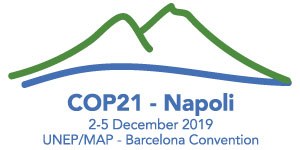
21st Conference of the Contracting Parties to the Barcelona Convention and its Protocols - COP21
A healthy Mediterranean for a sustainable future
The 21st Conference of the Contracting Parties to the Convention for the Protection of the Marine Environment and the Coastal Region of the Mediterranean (Barcelona Convention) and its Protocols will take place on 2-5 December 2019 in Castel ...
The 21st Conference of the Contracting Parties to the Convention for the Protection of the Marine Environment and the Coastal Region of the Mediterranean (Barcelona Convention) and its Protocols will take place on 2-5 December 2019 in Castel dell’Ovo, a historic castle by the sea located in the Gulf of Naples.
Ministers representing the 22 Contracting Parties of the Barcelona Convention and its Protocols, the Executive Director of UNEP, Ms. Inger Andersen, representatives of stakeholders and distinguished guests will attend the Ministerial Segment on 4 December 2019.
COP 21 will consider for adoption a number of draft decisions related to governance of the UNEP/MAP—Barcelona Convention system as well as to thematic issues. Furthermore, Cop 21 will discuss and eventually adopt the UNEP/MAP Programme of Work and Budget for 2020-2021.
Governance-related themes include, inter alia, the evaluation of the current UNEP/MAP Mid-Term Strategy and the preparation of the new one for 2022-2027, the Operational Communication Strategy, the roadmap for the preparation of a Data Management Policy, issues of cooperation and partnerships, as well as the work of the Compliance Committee – the body established in 2008 to advise and assist the Contracting Parties in meeting their obligations under the Convention and its Protocols and, to facilitate, promote, monitor and ensure such compliance.
Other draft decisions related to governance focus on the mid-term evaluation of the Mediterranean Strategy for Sustainable Development (2016–2025) and of the regional Action Plan on Sustainable Consumption and Production in the Mediterranean; as well as on environmental assessments in the Mediterranean, including the 2019 State of the Environment and Development Report and a preliminary assessment of risks associated to climate and environmental changes in the Mediterranean Region. Read more
